Energy saving system absorption refrigerating machine of ammonia s ynthesis installation: performance analysis and thermodynamic perfection evaluation
UDC 621.575
Galimova Larissa V., Kayl V. Ya., Vedeneeva A.I.
Abstract
Water-ammonia absorption refrigerating machine (ARM) efficiency evaluation is made. The machine is a part of ammonia synthesis installation of Azot Open Joint-Stock Company (Nevinnomyssk, Russia) running on converted gas heat form nitrogen monoxide converter. The analysis is based on the ARM operation data of the year 2009-2010 and experimental results of the year 2014-2015. Exergy analysis is used to estimate thermodynamic system effectiveness. The analysis of АRM performance is carried out taking into account the following characteristics of the machine operation conditions in different months of the year: final product output change, boiling temperature, decontamination interval, refrigerant consumption, full thermal load of the units, thermal factor and comparison of actual and design values of strong and weak solution concentration. ARM operation disturbances are shown to take place, the explanation of deviations being given. Character of deviations and their influence on the performance of the machine are reflected in exergy analysis results.
Keywords: energy saving, water-ammonia absorption refrigerating machine, ammonia synthesis, industrial experiment, technical characteristics, exergy analysis
Energy saving system absorption refrigerating machine of ammonia s ynthesis installation: performance analysis and thermodynamic perfection evaluation
Abstract
Water-ammonia absorption refrigerating machine (ARM) efficiency evaluation is made. The machine is a part of ammonia synthesis installation of Azot Open Joint-Stock Company (Nevinnomyssk, Russia) running on converted gas heat form nitrogen monoxide converter. The analysis is based on the ARM operation data of the year 2009-2010 and experimental results of the year 2014-2015. Exergy analysis is used to estimate thermodynamic system effectiveness. The analysis of АRM performance is carried out taking into account the following characteristics of the machine operation conditions in different months of the year: final product output change, boiling temperature, decontamination interval, refrigerant consumption, full thermal load of the units, thermal factor and comparison of actual and design values of strong and weak solution concentration. ARM operation disturbances are shown to take place, the explanation of deviations being given. Character of deviations and their influence on the performance of the machine are reflected in exergy analysis results.
Keywords: energy saving, water-ammonia absorption refrigerating machine, ammonia synthesis, industrial experiment, technical characteristics, exergy analysis












